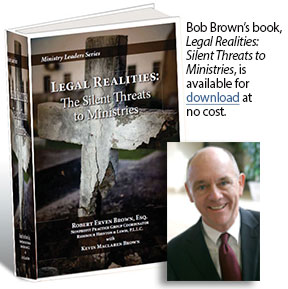In last week’s blog, we discussed how the public perception of churches has hit a downward spiral as America becomes more and more “litigation-go-lucky.” There’s a dangerous tendency in some quarters to believe that this is just the problem of the one denomination which has been hit hardest: the Catholic Church.
But, as we’ll detail below, this is not a problem confined to just one denomination; the forces at work in this environment are truly cultural, not denominational!
The Evangelical Lutheran Church in Mitchell, TX, for example was hit for more than $35 million in a sex abuse claim. It doesn’t take long to develop a Google search reflecting scores of cases against other denominations!
 Don’t fall prey to the myth that people won’t sue a religious organization. This short video explains why this dangerous myth might be relevant to your own church or ministry.
Don’t fall prey to the myth that people won’t sue a religious organization. This short video explains why this dangerous myth might be relevant to your own church or ministry.
The protestant church is not exempt from these problems
Here are just a few examples:
- In 2002, a member of the White River Valley Community Church recovered a $39,500 verdict against the church after he was removed from the church. The pastors wrote a letter to the members of the church advising that the member had damaged the church by creating discord. The letter didn’t specifically state how he was supposed to have done this. The jury found the pastors had defamed the member, and awarded him damages.
- In 2002, the pastor of St. Luke’s United Methodist Church in Columbus, OH, was ordered to pay $10.3 million after he had a sexual relationship with one of his parishioners, who had sought help for alcohol abuse and emotional problems.
In April 2004, a jury in Mitchell, TX, awarded $37 million against the Good Shepherd Evangelical Lutheran Church in a case involving sexual abuse. That verdict was in addition to a separate $32-million pre-trial settlement with the ELCA and its seminary in Columbus, OH. There were nine plaintiffs in the suit. - And, of course, the Penn State sex abuse scandal further eroded the public’s confidence in nonprofit institutions. Penn State settled the bulk of claims by child sex abuse victims of Jerry Sandusky by agreeing to pay $59.7 million to 26 men, in a major step to move beyond a scandal that cost millions and upended a once legendary football program. There are still unresolved claims from six other men, who said the former assistant football coach abused them as children.
Claims aren’t limited to sexual abuse
While there certainly are numerous examples of large judgments against churches, schools, day care providers and so on involving sexual abuse, these are not the only type of cases producing large verdicts against ministries.
For example, in 2003, a teenager recovered $4.75 million in a judgment against Idlewild Baptist Church after suffering severe injuries in a skiing accident. The teenager’s mother claimed that the church failed to provide appropriate instructions prior to allowing him to begin skiing. She also argued that there weren’t enough chaperones present. The defense counsel argued that the plaintiff was old enough to know whether not he should be skiing. The jury, however, found Idlewild Baptist 95-percent negligent and awarded the plaintiff $4.75 million.
In 2003, a college freshman recovered a $5-million settlement against Ozark Christian College in Joplin, MO, after being injured while on a school sponsored trip in a 15-passenger van provided by the school and driven by one of their students.
In 2004, a jury in Kansas City, MO, awarded a $1.2-million verdict against the Church of Jesus Christ of Latter-Day Saints when a father — a church employee — ran over the right foot of his 5-year-old son while on a riding lawnmower.
In 2005, the Catholic archdiocese in Wisconsin was found liable for $17 million when a church volunteer delivering a crucifix to a homebound parishioner was involved in an automobile accident. The volunteer — an 82-year-old semi-retired barber — was driving through a Milwaukee intersection when he collided with the plaintiff. The jury found that diocese was liable for the actions of its volunteer driver and assessed the $17-million verdict.
In 2005, a high school cafeteria food fight led to a $5-million verdict after insults were traded on a social media page.
In 2011, a jury in Texarkana, TX, awarded $66-million verdict against Tony Alamo, who claimed to be a prophet of God, and his church for administering “biblical spankings.”
The cultural conflict between legal and spiritual concerns
Further evidence of the divisive effect of these lawsuits was highlighted in a <I>USA Today<$> article on May 10, 2011. The paper reported about the clash between the Vienna Presbyterian Church in Vienna, VA, and GuideOne Insurance, its liability insurance company. When the church announced its plan to acknowledge its failure in handling reports of sexual abuse by a youth minster, the insurance company instructed its attorneys to warn the church not to make any statements. The church’s governing “session” went ahead, despite the warning, and apologized to the congregants.
In a sermon the following Sunday — March 27 — Pastor Peter James went further: “We won’t hide behind lawyers. … Jesus said the truth will set us free.”
The blog posts commenting on the article reflected a full range of public reactions, from condemnation, to praise of the courageous position which the church took.
The size of the verdicts keep climbing
According to Arizona Attorney magazine, the top Arizona verdict in 2010 was for $110 million. There were 22 verdicts of more than $1 million.
Nationally, the largest verdict was for $1.3 billion in a copyright infringement case.
 Robert Erven Brown is an attorney licensed to practice in Arizona. He and his nonprofit practice group work with nonprofits and churches helping them manage key operations connected with their missions, visions and causes. As permitted by local Rules of Ethics, they collaborate with attorneys who are licensed in states other than Arizona. Bob is author of Legal Realities: Silent Threats to Ministries, which describes his Campus Preservation Planning© initiative — a comprehensive program designed to manage the wide array of risks facing non-profit organizations. He can be reached by email or by calling 602.744.5748. RHL is located at 201 North Central Ave., Suite 3300, Phoenix, AZ 85004.
Robert Erven Brown is an attorney licensed to practice in Arizona. He and his nonprofit practice group work with nonprofits and churches helping them manage key operations connected with their missions, visions and causes. As permitted by local Rules of Ethics, they collaborate with attorneys who are licensed in states other than Arizona. Bob is author of Legal Realities: Silent Threats to Ministries, which describes his Campus Preservation Planning© initiative — a comprehensive program designed to manage the wide array of risks facing non-profit organizations. He can be reached by email or by calling 602.744.5748. RHL is located at 201 North Central Ave., Suite 3300, Phoenix, AZ 85004.
This publication is offered as a public service by the Nonprofit Practice Group at Ridenour, Hienton & Lewis (RHL) for general educational purposes to provide accurate and authoritative information on general principles of law. It is not intended to provide, and may not be relied on as, legal advice. The publisher is not engaged in rendering legal, accounting or other professional service. If legal advice or other expert assistance is required, then services of a competent professional person should be sought. “From a Declaration of Principles jointly adopted by a Committee of the American Bar Association and a Committee of Publishers and Associations.” This article may not be used as a substitute for competent legal advice from a licensed professional attorney in your local jurisdiction. No “informal” legal advice will be provided by telephone. Simply sending an e-mail to Mr. Brown will not create an attorney-client relationship. A formal attorney client relationship will not be established until a conflict check is completed and an engagement letter has been signed by both the attorney and the client.


